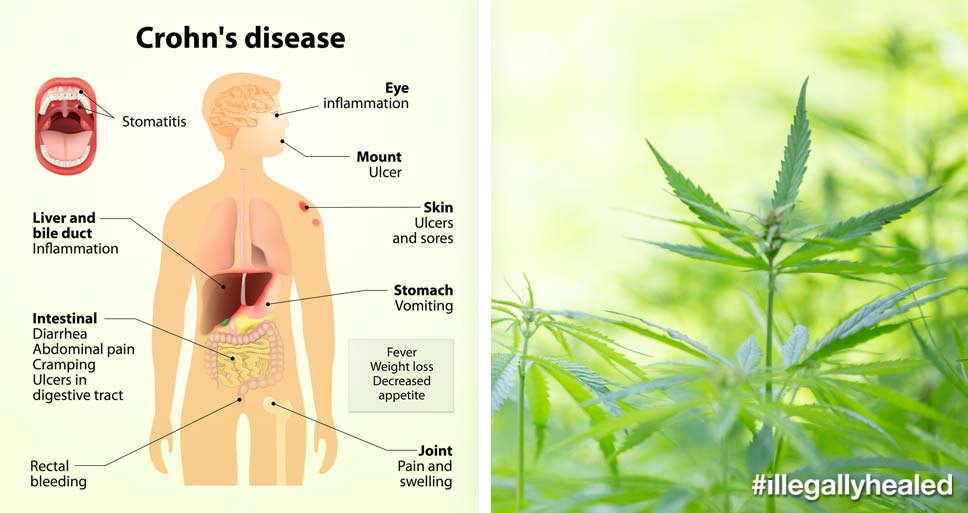I was diagnosed with Crohn’s Disease 12 years ago and got my first medical cannabis card in California around the same time. I have written about it online and I happily talk about it whenever prompted. I am frequently asked the same question, “what’s the best strain for Crohn’s Disease?”
First and foremost, I am afraid to answer the question because I don’t want my personal opinions to be misconstrued as actual medical advice. I am not a doctor, just a patient with a lot of years and personal experience with traditional healthcare and pharmaceutical drugs as well as alternatives and botanicals.
And, I have always been unsure how to answer because I really don’t know, but I realize the question is poised because of the ideology behind our for-profit healthcare system, on that promotes pharmaceuticals explicitly over herbal medicines. The question comes from a world where millions of dollars are raised to run and search and hope and pray for single-compound drug cure miracles, as if the answers could only be man-made but remain undiscovered, only to be unlocked by billions of charity dollars. And, because treating a lifelong autoimmune disease like Crohn’s has become big business in our globalized speculative economy, finding the “magic strain” really would be a billion-dollar discovery.
So I realized how to answer this question, and the concept isn’t exclusionary to Crohn’s Disease, it’s basic science and logic. Every nutritional input a human puts in their body matters and different plants provide different nutrition. It’s why we eat citrus fruits for C vitamins, drink coffee for energy, chew on ginger for nausea or eat tomatoes for lycopene. Nature provides a lot of the inputs we might be seeking.
Using herbal medicine to treat or control symptoms is empowering, and that’s important for patients who are usually just made to feel like victims of an uncontrollable force. Herbal medicine, as opposed to pharmacologicalism, is highly personalized and requires a patient be responsible for assessing, treating and studying their own symptoms and improving their own day-to-day quality of life.
Because cannabis is an incredibly versatile herbal medicine and there is such a huge genetic diversity of strains and methods of ingestion available, there are a lot of different effects that can be produced by the same non-toxic plant. A patient can grow her own and smoke or vaporize to address acute symptoms and safely make infused butters and oils or alcohol-extracted tinctures at home for on-the-go or longer-lasting effects. If a patient lives in a legal state, they can buy similar or more processed products in a store if they choose.
It’s imperative a patient log and track what strains and methods of ingestion they are using and the effects, because nobody else, not even a doctor, really knows how to treat a disease like Crohn’s and the best anyone can do is help manage the symptoms. If cannabis helps treat any disease’s symptoms then it is a safer choice than the pharmaceutical alternative that can be prescribed. That much is known.
So, I personally don’t think there is such a thing as a “good strain for Crohn’s”.
Because, as a patient with Crohn’s, if I were to go the 100 percent pharmaceutical approach, a doctor would prescribe me a biological immunosuppressant (Remicade or Humira) to control the inflammation causing the most urgent-to-treat symptoms of my disease. For pain I would be prescribed opiate painkillers. For urgent inflammation I would be prescribed steroids (Prednisone) which causes a whole host of side effects that could be treated with their own sets of dangerous drugs; depression, insomnia, acne, mood swings, bloat, food cravings and joint pain, to name just a few.
Patients should always tell their doctors what they are doing and consult with them, but also know that all they can really do is listen to complaints about symptoms, perhaps qualify them with an expensive test and prescribe FDA-approved for-profit drugs to treat the symptoms.
Cannabis is just one of many different inputs patients can choose to utilize to treat the symptoms of disease and perhaps put it into remission. Diet, exercise, lifestyle, environment and personal circumstances are also relevant inputs that affect disease treatment, but ultimately the only person who can improve a patient’s quality of life is the actual patient. There are no quick fixes or easy answers.


Comments 1
Pingback: Best Cure For Eds | Cure ED Naturally Treatment